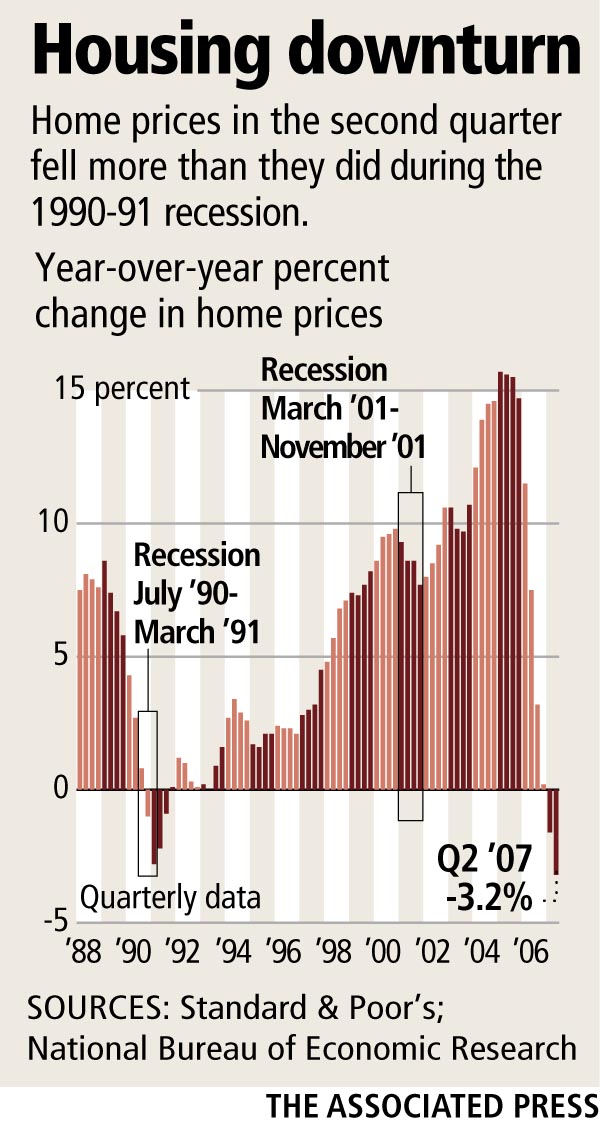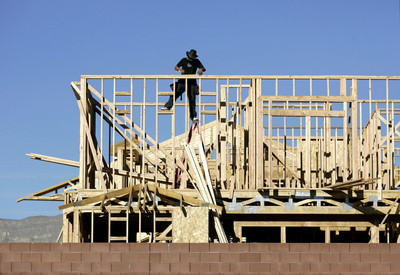Speculators bet against housing


WASHINGTON — U.S. home prices have fallen further since mid-2006 than during the 1990-91 recession and professional traders bet they’ll plunge up to 10 percent more the next year.
At the same time, a West Coast university economist is predicting home prices will drop 20 percent over the next few years in Nevada and two other states.
If the speculative traders making big-money bets on where housing prices are headed are right, the question is not whether a U.S. recession is ahead but when it will start.
Sizable drops in home prices in a year would likely curtail consumer spending sharply. Yale University economist Robert Shiller, who has long warned of inflated home prices, says a big hit to U.S. housing assets, worth about $23 trillion, would shock the broader economy.
“It will upset balance sheets, it will upset lots of our economic institutions,” said Shiller, who argues that prices were driven higher by greed, not people looking to buy a place to live. Adjusting for inflation, housing prices have soared 86 percent in the past decade although some cities, such as New York, Los Angeles and Washington, saw far larger jumps than most regions of the country.
Yet homeowners across the nation tapping into credit lines pegged to the value of their houses has been a potent economic driver in recent years. For the vast majority of U.S. households, the home is the most substantial financial asset they hold. If its value plummets so does their sense of prosperity, which can restrict spending on everything from vacations to cars and eating out or buying new clothes.
Home prices fell less than 3 percent during the economic downturn of the early 1990s and rose through the 2001 recession, but have already dropped 3.2 percent over the past year, according to a closely watched housing market index created by Shiller.
“This time, we’re in a bigger boom, and we face the possibility of a bigger decline,” Shiller told lawmakers last week. “It’s not just an issue of a recession coming up, it’s an issue of a drag on the economy, which might extend over many years.”
Record energy prices are stirring recession worries as the U.S. heads into the coldest season of the year in most parts of the country.
Signs of the housing market fallout are easy to find. Employers cut jobs in August for the first time in four years. Especially hard hit: homebuilders and mortgage lending companies.
On Tuesday, homebuilder Lennar Corp. posted a third-quarter loss of more than $510 million, said it had cut its work force by 35 percent so far this year; it warned of future job losses.
Lennar’s disappointment came the same day the National Association of Realtors reported existing home sales fell in August to the lowest level in five years.
The slowdown is extending to major retailers, including Target Corp. and Lowe’s Cos., which have trimmed profit expectations for the year as consumer spending wanes.
“It’s going to be a distressingly long time before we get back to normal,” said University of California, Los Angeles economist Edward Leamer, who predicts a 20 percent price slide over three or four years in once red-hot real estate markets like California, Nevada and Florida.
Since the magnitude of this housing boom was unprecedented, economists are uncertain about how severe the downturn will be, says Susan Wachter, a real estate and finance professor at the University of Pennsylvania’s Wharton School of Business. She rates the odds of recession in the next year at one in three.
“We are in uncharted territory,” she adds, noting that a recession would further slow recovery in the battered housing market.
Former Federal Reserve Chairman Alan Greenspan estimates the likelihood of recession, generally defined as two consecutive quarters of a decline in economic growth, is less than 50 percent but greater than 1-in-3 odds.
The Fed, chaired by Ben Bernanke, calculates that a 20 percent drop in inflation-adjusted home prices over two years would cut U.S. economic growth up to 11/2 percentage points after three years. The delay in the impact represents how long it takes negative or positive events to show up in GDP when the economy is as large and as dynamic as in the U.S., according to Fed research.
Not everyone sees a gloomy outlook. The National Association of Realtors industry trade group, which had been criticized by economists and bloggers for its sunny predictions during the boom times, remains optimistic.
The group’s senior economist, Lawrence Yun, projects home sales will stabilize after modest gains early next year.
Peter Orszag, director of the nonpartisan Congressional Budget Office, told lawmakers last week that financial market turmoil, weakened consumer confidence and the housing market downturn pose economic threats but are not likely to sink the economy.
On the plus side, the nation’s unemployment rate is low as are long-term interest rates. Benchmark stock indexes are up for the year despite a rocky summer and inflation appears to be in check.












